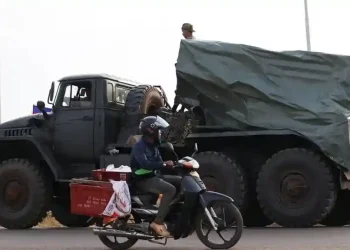Israel’s Commitment to Preventing Iran’s Nuclear Weapons Development
Netanyahu vows to prevent Iran from acquiring nuclear weapons following IDF strikes
During the opening session of the Knesset’s winter assembly, Israeli Prime Minister Benjamin Netanyahu emphasized Israel’s firm stance against Iran’s pursuit of nuclear weapons. He highlighted a recent airstrike by the Israel Defense Forces (IDF) that targeted Iran’s conventional military assets, including its facilities for producing antiballistic missiles.
“Stopping Iran’s nuclear program is our top priority. While I cannot disclose all our strategies and actions, it is a crucial focus for us,” Netanyahu stated.
He outlined a long-term strategy aimed at dismantling what he referred to as the “axis of evil,” cutting off Iran’s military capabilities both in the South and North. Netanyahu stressed the importance of imposing severe consequences on Iran and its allies, asserting, “I have not given up on this central goal, and we will not give up.”
Netanyahu faced criticism for not ordering a strike on Iran’s nuclear facilities, especially as the Biden administration publicly advised against such actions. Critics argue that he is yielding to U.S. pressure, compromising Israel’s strategic interests. In his speech, Netanyahu defended his position, asserting that the recent airstrike is a significant setback for Iran, which poses threats to Israel, the region, and beyond.
“Iran aims to build a stockpile of nuclear weapons to destroy us and is developing long-range intercontinental missiles,” Netanyahu warned, noting that Iran is establishing a missile production industry.
According to Netanyahu, Israel serves as a barrier to Iran’s ambitions, stating that if Israel were to fall, the Middle East would also be at risk. “But we will not fall. We will succeed, and the world will be safer,” he said.
He placed Israel’s struggle against Iran within a broader historical context, mentioning that while Pan-Arabism initially threatened Israel, the country ultimately overcame assaults from Arab armies and established peace with neighboring countries like Egypt and Jordan. Now, he argues, the Islamic Republic poses a new threat, aspiring to create a regional empire that excludes Israel.
Netanyahu described Iran’s strategy to eliminate Israel as resting on three pillars: proxy attacks on Israel, ballistic missile development, and nuclear weapons acquisition. He noted that over the past year, the IDF has significantly weakened Iranian proxies, such as Hamas in Gaza and Hezbollah in Lebanon, while also damaging Iran’s missile capabilities.
Reflecting on the past year since the October 7 attacks—where over 1,200 people were killed and many taken hostage—Netanyahu acknowledged that Israel had faced a major setback but had managed to regroup and achieve military successes that are reshaping the Middle East.
He likened the current situation to a modern-day War of Independence, recalling that in 1948, Israel fought against seven armies. Today, he noted, Israel faces threats from multiple fronts.
Netanyahu also expressed condolences to families who lost loved ones during the October 7 attacks and praised the IDF soldiers for their bravery. He reaffirmed that the main goals of the ongoing conflict with Hamas are to dismantle the organization and secure the return of 101 remaining hostages.
He committed to using every possible means to bring all captives home, both the living and deceased. Additionally, he emphasized Israel’s determination to establish safe conditions for residents in the South and North to return to their homes, which he described as “absolute victory.”
Netanyahu reiterated Israel’s commitment to making its own security decisions, despite ongoing discussions with the U.S. “The critical decisions regarding our security, including our goals and objectives, are determined by us,” he stated.
Regarding the recent airstrike on Iran’s military sites, Netanyahu announced that the IDF successfully struck numerous military targets throughout Iran. “We have shown that our reach extends to any place where threats against Israel arise. We significantly impaired Iran’s defense systems and its missile production capabilities,” he said.
He emphasized that the IDF’s targets were not merely symbolic but rather substantial military installations, stating, “We delivered a serious blow to these industrial death factories.”
This article was rewritten by JournosNews.com based on verified reporting from trusted sources. The content has been independently reviewed, fact-checked, and edited for accuracy, neutrality, tone, and global readability in accordance with Google News and AdSense standards.
All opinions, quotes, or statements from contributors, experts, or sourced organizations do not necessarily reflect the views of JournosNews.com. JournosNews.com maintains full editorial independence from any external funders, sponsors, or organizations.
Stay informed with JournosNews.com — your trusted source for verified global reporting and in-depth analysis. Follow us on Google News, BlueSky, and X for real-time updates.














